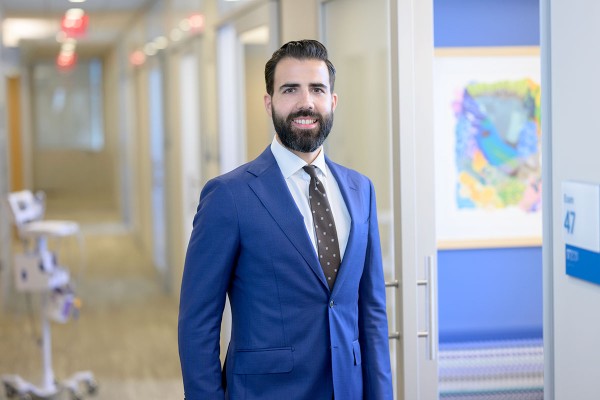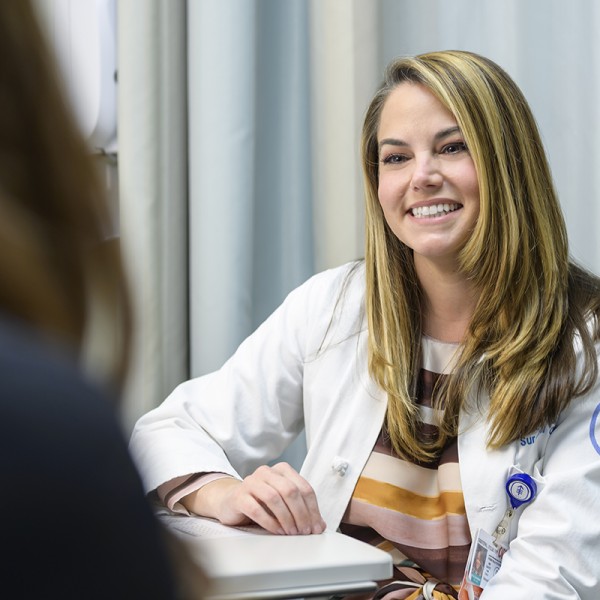
Daniel E. Lage, MD, MBA, MSc
We post reviews for MSK healthcare providers who have at least 30 patient experience surveys completed. If you do not see reviews for a provider, it may be because they do not yet have enough survey responses, or the provider may not be part of the group of healthcare providers included in the survey.
Only outpatient providers are included in the survey. Healthcare providers who only work in the hospital or in urgent care are not included in the survey. Pathologists or researchers who do not provide direct care to patients do not have reviews.
Areas of Expertise
Conditions I Treat
- Genitourinary cancers and conditions
- Prostate cancer and conditions
- Bladder cancer
My Specialties
- Supportive care
- Cancer care for older adults
Get to Know Me
I am a medical oncologist who cares for people with genitourinary cancers, including prostate, bladder, kidney, and testicular cancer.
My interest in oncology stemmed from being a young adult caregiver for my own grandparents as they faced cancer and complex illnesses. They were immigrants with limited means, and that experience makes me committed to delivering the quality of care for my patients that I wish my grandparents had access to back then.
As we have more effective options for treating cancer, I focus on guiding people through the benefits, potential side effects, and quality of life implications of their unique cancer journey. One of the joys of being a genitourinary medical oncologist is collaborating closely with our excellent radiation oncology and urologic surgery colleagues and bringing new treatments to patients through clinical trials.
I am also a member of the Acute and Supportive Care service at MSK where I conduct research to develop more patient-centered ways of caring for people with cancer, preventing them from being hospitalized, delivering home-based and virtual care, and improving survivorship. I also have an interest in cancer rehabilitation and geriatric oncology, or the cancer care of older adults. I believe strongly that preserving function and quality of life as patients go through cancer treatment and survivorship is essential.
Before coming to MSK, I was on the faculty at Massachusetts General Hospital and Harvard Medical School. I completed my oncology fellowship at the Dana-Farber Cancer Institute/Mass General Brigham combined program, funded by a National Cancer Institute research fellowship in oncology population sciences and a Conquer Cancer Foundation Career Pathway Grant in Symptom Management.
I'm a genitourinary (GU) medical oncologist, which is a cancer doctor who specializes in genitourinary (jeh-nih-toh-YOOR-ih-nayr-ee) cancers. This includes bladder, kidney, penis, prostate, and testicular cancers.
- Assistant Attending Physician
Conditions I Treat
- Genitourinary cancers and conditions
- Prostate cancer and conditions
- Bladder cancer
- Kidney (renal cell) cancer and conditions
- Testicular cancer
My Specialties
- Supportive care
- Cancer care for older adults
Education
- MD, Harvard Medical School
- MBA, University of Oxford
- MSc, University of Oxford
Residencies
- Internal Medicine, Massachusetts General Hospital
Fellowships
- Medical Oncology, Dana-Farber Cancer Institute
Board Certifications
- Internal Medicine, Medical Oncology
Awards and Honors
- Merit Award, American Society of Clinical Oncology
- Conquer Cancer Foundation Career Pathway Grant in Symptom Management
- National Cancer Institute Training in Oncology Population Sciences T32 Program
- Rhodes Scholarship
- John Harvard Scholarship
Insurance Information
Understanding your insurance options is an important part of managing your cancer care. We have relationships with many common healthcare providers and plans.
In Network Coverage Type
HMO, EPO PPO, POS, Transplant
In Network Coverage Type
PPO
In Network Coverage Type
PPO, POS, EPO, HMO
In Network Coverage Type
PPO, HMO
In Network Coverage Type
HMO, PPO
In Network Coverage Type
HMO
In Network Coverage Type
HMO, PPO
In Network Coverage Type
HMO, EPO PPO, POS
In Network Coverage Type
Supplemental
In Network Coverage Type
PPO, POS, HMO
In Network Coverage Type
POS, EPO, HMO
In Network Coverage Type
State Government
In Network Coverage Type
State Government
In Network Coverage Type
PPO, POS, EPO, HMO
Offers a qualified health plan from the Health Insurance Marketplace. Call Emblem to learn more.
In Network Coverage Type
HMO
In Network Coverage Type
PPO, HMO
In Network Coverage Type
HMO
In Network Coverage Type
PPO
In Network Coverage Type
HMO, EPO
Offers a qualified health plan from the Health Insurance Marketplace. Call Fidelis to learn more.
In Network Coverage Type
HMO
In Network Coverage Type
PPO
In Network Coverage Type
State Government
In Network Coverage Type
EPO, HMO, PPO, POS
Offers a qualified health plan from the Health Insurance Marketplace. Call Healthfirst to learn more.
In Network Coverage Type
HMO
In Network Coverage Type
PPO EPO
In Network Coverage Type
HMO
In Network Coverage Type
PPO
In Network Coverage Type
EPO
In Network Coverage Type
EPO
In Network Coverage Type
TBD
In Network Coverage Type
PPO, POS, EPO
In Network Coverage Type
Federal Government
In Network Coverage Type
HMO
City Employee Health Plans (Gold and Gold Care)
In Network Coverage Type
Supplemental
In Network Coverage Type
PPO/OAP
In Network Coverage Type
PPO, POS, EPO, HMO
In Network Coverage Type
HMO/EPO
In Network Coverage Type
PPO, EPO
In Network Coverage Type
State Government
In Network Coverage Type
PPO, POS, HMO
In Network Coverage Type
PPO, HMO
In Network Coverage Type
PPO, POS
In Network Coverage Type
PPO, POS, HMO
Don't see your carrier or plan? We can help you understand your coverage.
If you don't have health insurance or are worried that your care may not be fully covered, our financial assistance programs may be able to help.
If you have questions about insurance, call us at 646-497-9176.
Make an Appointment

Contact and Location
Looking to see a doctor at a different location? See all MSK locations.
Colleagues
Doctors at Memorial Sloan Kettering work as teams, with specialists from all different areas. This allows us to consider all your needs together, and to give you the best possible care.
Clinical Trials

Memorial Sloan Kettering's doctors and scientists are constantly developing new treatments for cancer. MSK is typically running hundreds of clinical trials at a given time.
You may be able to participate in a clinical trial even if you are new to MSK. Search our online directory to find trial information and see more about who can participate.
Search clinical trialsResearch and Publications
Visit PubMed for a full listing of Dr. Lage’s journal articles. Pubmed is an online index of research papers and other articles from the US National Library of Medicine and the National Institutes of Health.
See all on PubMedPatient Reviews
Your trust is our main concern
We strive to keep reviews trustworthy, honest and fair. Learn more about our patient experience reviews.
Disclosures
Members of the MSK Community often work with pharmaceutical, device, biotechnology, and life sciences companies, and other organizations outside of MSK, to find safe and effective cancer treatments, to improve patient care, and to educate the health care community. These activities outside of MSK further our mission, provide productive collaborations, and promote the practical application of scientific discoveries.
MSK requires doctors, faculty members, and leaders to report (“disclose”) the relationships and financial interests they have with external entities. As a commitment to transparency with our community, we make that information available to the public. Not all disclosed interests and relationships present conflicts of interest. MSK reviews all disclosed interests and relationships to assess whether a conflict of interest exists and whether formal COI management is needed.
Daniel E. Lage discloses the following relationships and financial interests:
-
Bristol-Myers Squibb
Professional Services and Activities
-
Despierta, LLC
Professional Services and Activities
If you’re a patient at MSK and would like more information about your doctor’s external relationships, please talk with your doctor.
The information published here is a complement to other publicly reported data and is for a specific annual disclosure period. There may be differences between information on this and other public sites as a result of different reporting periods and/or the various ways relationships and financial interests are categorized by organizations that publish such data.
This page and data include information for a specific MSK annual disclosure period (January 1, 2024 through disclosure submission in spring 2025). This data reflects interests that may or may not still exist. This data is updated annually.
Learn more about MSK’s COI policies here. For questions regarding MSK’s COI-related policies and procedures, email MSK’s Compliance Office at [email protected].